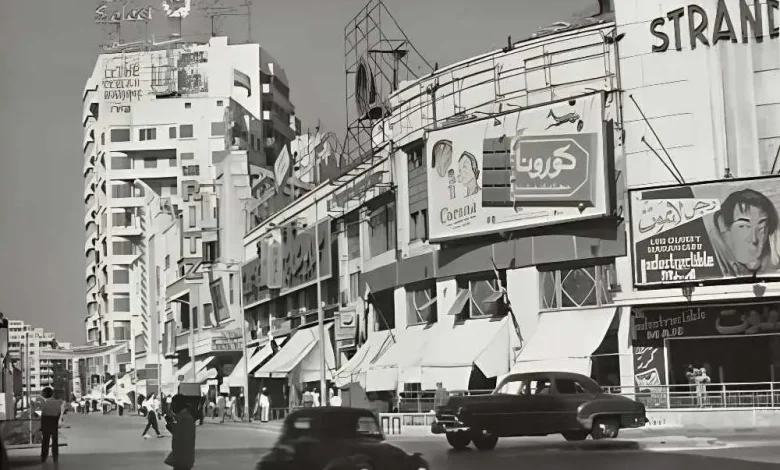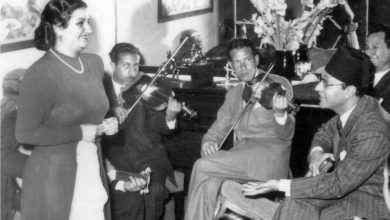
No one fears the darkened hall
In my youth, my passion for magic lanterns, treasure chests, and all things similar and delightful became my window onto the world of “fantasy.” It was a word that stayed with me for a long time in my reading books and in composition and rhetoric, where it became a kingdom of the senses, delighting me and filling my soul with ecstasy, joy, and pleasure, inspiring my imagination and vision and filling me with magic and wonder. At that time, I was captivated by the allure of cinema, where the halls and stairwells resembled spacious corridors that I loved to walk through and admire. I was dazzled by the silence and the dim lights with their long shadows, and I was captivated by the same flicker, the same spectrum, the same glow.
At that time, I explored the movie theaters near my neighborhood, where third-rate movie theaters called “al-Tarsu” proliferated in many working-class neighborhoods. My eyes lingered on the beautiful and attractive posters, or the sign “Two films in one program” and pictures of some scenes from the films on glass panels that adorned the walls of the cinema entrances.
***
Cinema Al-Hadra, Al-Halmia, Cinema Riviera… We would go with our neighborhood friends, in a rush, at random times and without any preparation, perhaps on holidays, Thursdays and Fridays. We would come in our home clothes, galabiyas, pajamas, and perhaps trousers, barefoot or in poor or worn-out shoes.
We spend what little money we have on movie tickets, and often one of us boldly pushes through the crowd to get all the tickets for everyone.
Sometimes, some of our friends would come with loaves of bread, pulp, and poor-quality fruit from the carts scattered in front of the cinema, and some would carry bottles of cheap Polanaki wine, so we could share what we had during the show with childlike joy. When darkness falls in the theater before the show, some ask, “What’s the name of the movie?” or “Is it a story or just scenes?” There is often a lot of noise among the groups of boys in the theater, especially when the projector breaks down.
This is reflected in the escalating slapping of wooden seats, accompanied by swearing and cursing, or the repeated clashes with a “spectator” who is indulging in his passion with his lover. Even riots break out with the “spectator” in the balcony, “Al-Primo,” thinking that there are “masters” superior to the rabble like us, and the hall witnesses flying shoes and similar food scraps that we brought with us, as if there were another film playing next to the screen.
***
Perhaps a “friend” who barely knows how to read will “decipher” what is happening in the foreign film, with a narration full of gross errors, or recount events that have no connection to the actual events. We found foreign films more enjoyable, with their famous action scenes, violence, and heroes who never die “Waloula and his friend,” and the sexual and seductive scenes. Some boys would go to the bathroom during the screening to masturbate, and through Western cinema we got to know Gertrude Garbo, Steve Rivers, Raquel Welch, and other stars.
The “Ablasi,” the usher, was always present, a man carrying a flashlight, always rude and cunning. He directs us to our seats and determines the best viewing location, as if the cinema were his own. He is responsible for collecting money, charging a penny, so that the “spectators” get the back rows, while he gets the front rows. He gives special attention and protection to those who pay more than the lovers.
***
Finally, we leave the brightly lit hall, bidding farewell to the film that some have forgotten but others still remember. We are accompanied by the comments of our friends, which are always filled with petty disputes. Some praise it, while others declare their disapproval, and voices cry out, “Cinema is over… Give us our money back.“ In the crowd, we encounter more than one newcomer, a delegation waiting for another promising party and a recurring question in an attempt to capture a point of view on the film: ”Great or bad?”
Then we move on to another cinema or continue the commotion with other groups in neighboring neighborhoods. Often, some people watch the same film over and over again, and we reproduce our collective ritual once more.
***
In my youth, in the prime of my life… the world was no longer the world… it had changed, and I lived a new life… carrying the same pulse and the same spark, my childhood friends scattered… I made new friends as I stepped into the world of literature and the arts, and my love of cinema remained one of my many interests. I discovered books and frequented Nabi Daniel Street (Book Street) and the old bookstores that were full of books on various subjects at low prices.
The Akhwan al-Safa and Khulan al-Wafa bookstore on Al-Attarin Mosque Street, owned by Muhammad al-Mufti, and nearby the Istinara bookstore, which specialized in Western books; the Anwar bookstore on Al-Bira Street in Kamp Shizar, owned by Anwar al-Jawhari; and Uncle Maurice’s bookstore on Souq Shadia Street, where the bookstore’s sign read “The head of wisdom is the fear of God.” I then headed to Columbia House Records on Saad Zaghloul Street, where I listened to cassette tapes. My love for international music emerged early on with Tchaikovsky, Carl Orff, Strauss, and even the Greek composer Athenax. He also listened to these pieces on the radio music program. I never missed the opportunity to visit the auction houses on Fouad Street and the Attarine neighborhood to closely admire the paintings hanging on their walls, which delighted me.
***
At that time, I sought out other, more upscale neighborhoods, crossing Abu Qir Street toward Belouz Street and Al-Bira Street, where large segments of the middle class lived, as well as some Greeks and Armenians. I knew the Lagti cinema, owned by Jean Vadouzi, and the Odeon cinema, owned by the Arslatides brothers. I also knew other spectators from that middle class, boys and girls, men and women, who devoured Garbis’s “Greek confectioner” ice cream. They watch different films by international cinema icons such as Antonioni, Fellini, Bergman, Costa-Gavras, and others. At that time, I also devoured theater and cinema magazines, where I read many of the scripts published in them.
“Mahatat Al-Raml” never left me; it was my favorite place on my journey into the world of cinema, where going there was a special occasion that required special preparation and dressing up, which I enjoyed at the time and which represented another qualitative path. I went to Cinema Plaza with its owner, Marie Filibuds Aratimous, and to Al-Hamba with its owner, Elie Lutfi.
I was captivated by the nightly “Soirée” at the Royal and Rialto Metro cinemas, where I witnessed a unique audience belonging to the upper social classes, a cinema marked by a crowd of gentlemen and ladies in excessive elegance, confirmed by a space filled with the scent of fine perfumes and the latest hairstyles and the latest hairstyles that expressed social status.
***
I was captivated by the freshness of the charming ticket sellers, as we kept our tickets tucked into our books, and I was enchanted by the cinema, the cinema of Godard, Lelouch, Sydney Pollack, Kubrick, and captivated by the stars of the time, Audrey Hepburn, Belmondo, Jane Fonda, Alain Delon, and others.
I needed another horizon to complement my first love of cinema, so I joined free circles and forums interested in cinema, such as the cinema group at the Museum of Fine Arts and the Jesuits, where these groups presented new trends and experiences in cinema that we had never known before, alongside foreign cultural centers such as the Soviet Cultural Center and the Gouy Institute. The Soviet Cultural Center and the Goya Institute, for example. Cinema remains the imagination woven by many generations throughout the ages.




